Look up free Massachusetts divorce records today using this brief resource. Divorce records are official documents proving a marriage dissolution occurred between two Massachusetts residents.
The Commonwealth of Massachusetts guarantees access to public records, thanks to the state’s Public Records Act (MPRA) and its related regulations. According to these statutes, each person has the right to get copies of public records either for free or at a reasonable fee.
This resource covers the various custodians, search tools, contact information, addresses and other helpful information that streamlines and expedites a search for divorce and dissolution of marriage records throughout Massachusetts.
Are Divorce Records Publicly Available in Massachusetts?
Public divorce records in the state are issued, stored, and managed by the Massachusetts Court System.1 All citizens have access to divorce records and can get copies of those records, according to Massachusetts Public Records Act (MPRA).
While citizens have access to Massachusetts dissolution records, there are several limitations. For example, access to divorce records containing information that can create dangerous situations for a person or that can violate someone’s personal rights is only available to the persons listed on the record or to their attorney. Alternatively, a court order can grant access to these divorce records.
Other examples of sensitive case information include:
- Personal Information (concerning a minor, a victim of domestic abuse or assault)
- Financial or Social Security Information
- Property Details
- Medical Information (about the individuals mentioned in the divorce)
Please remember that divorce records in Massachusetts are managed by the local county family and probate court. Always consult with the custodian to find out if you can access a specific divorce record.
The Commonwealth of Massachusetts has a very low divorce rate when compared to the rest of the country. According to a report published by the Centers for Disease & Control Prevention (CDC), the Commonwealth has a divorce rate of 1 per 1,000 residents, much lower than the national average of 2.5 per 1,000 residents (data from 2021).2
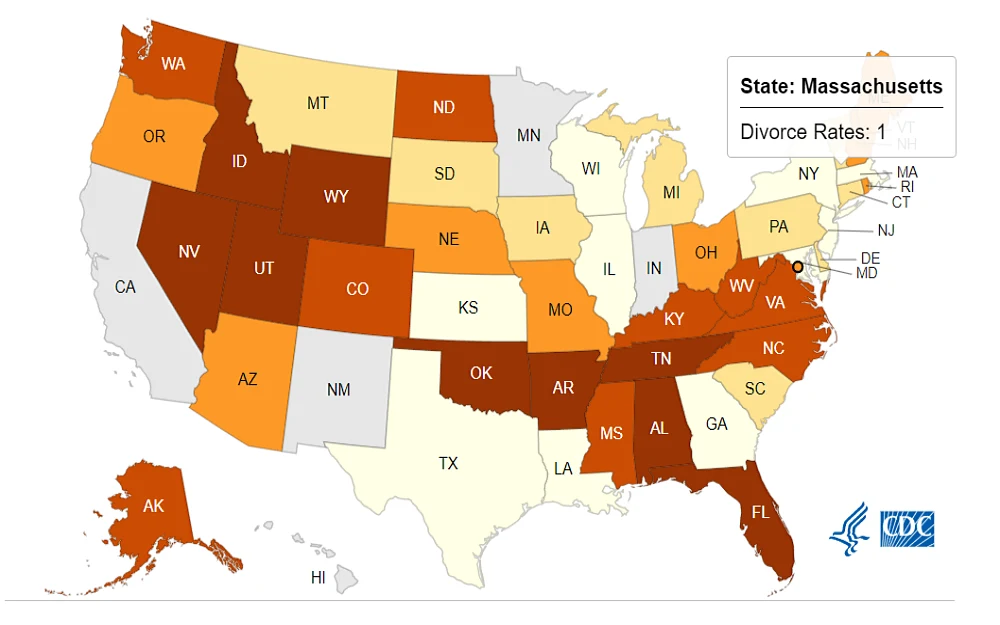
In a similar report published by Bowling Green State University, the divorce rate in Massachusetts is 12.8 divorces per 1,000 women, lower than the national average of 14 divorces per 1,000 women (data from 2022).3
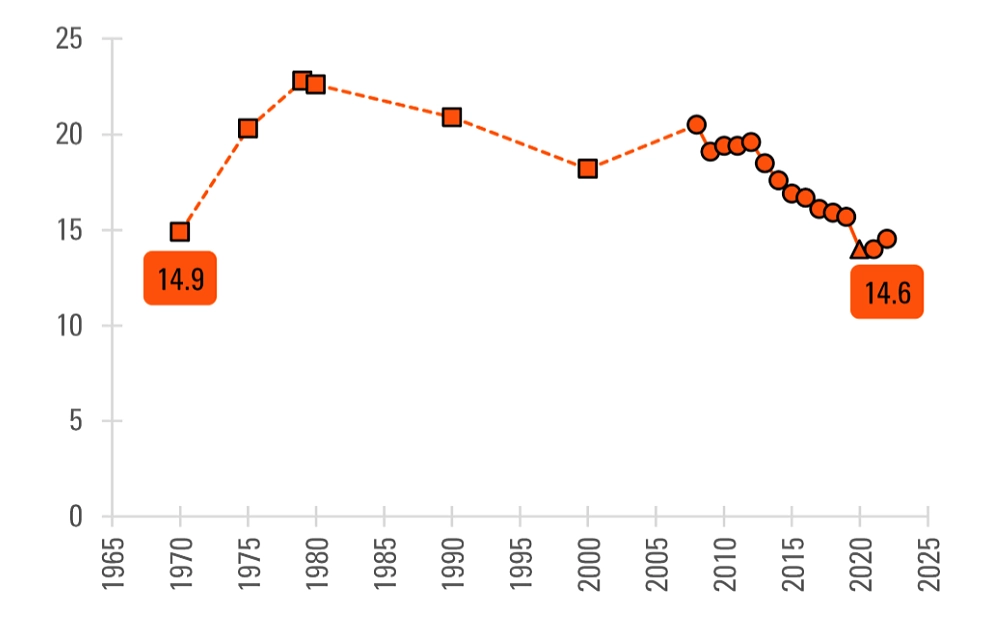
How To View Free Massachusetts Divorce Records
The Commonwealth of Massachusetts offers multiple ways to obtain divorce records. Typically, interested persons should start their free public divorce records search.
The first thing you need when looking for Massachusetts dissolution records is the docket number of the specific divorce case. If you don’t have the docket number, you can find it by searching using your case number on the Online Case Search Tool provided by the Massachusetts Court System; follow the steps outlined on the website.4
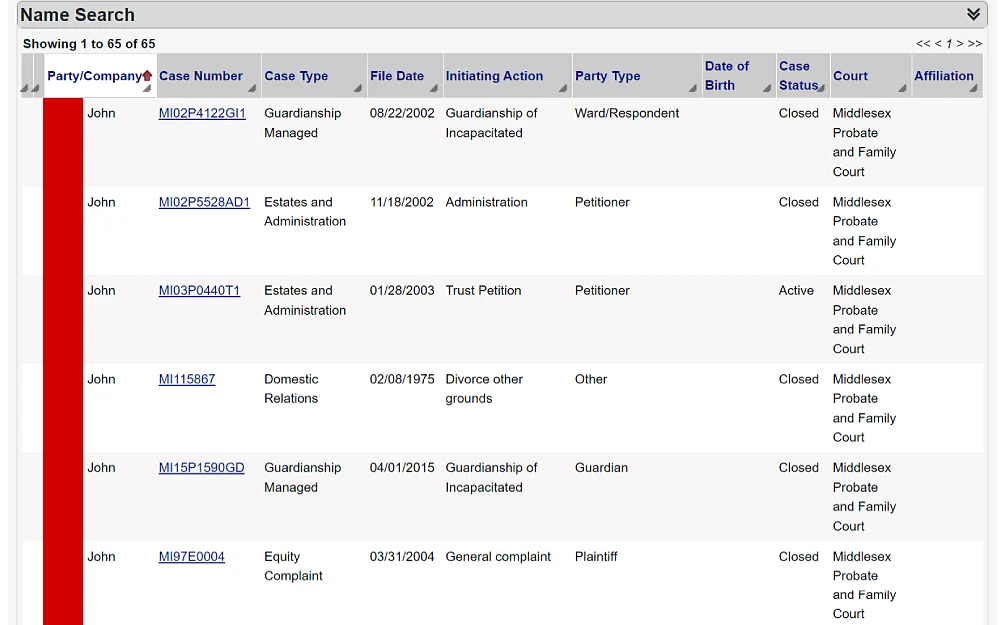
Alternatively, you may call or visit the Probate & Family Court that issued the divorce; you can refer to this list of courts in the Commonwealth.
Check the online platform provided by the Probate & Family Court Virtual Registry; make sure to check the county that issued the divorce before using the tool.
In Massachusetts, the county that issued the divorce is also the county where these records are stored and managed. The same county court will also issue divorce decree copies to interested persons.
If you don’t know the county that issued the divorce, contact any court and ask for more information or ask to search by name. Talk to the staff and explain what you are looking for and provide the following information, if you have it:
- The Type of Documents Needed (or the case you are asking about)
- Names of the Parties
- Date of the Divorce
- Location (where the divorce documents were filed (city, county))
After you get all the information listed above, you will have to download, print, and complete the Request for Copies Form. Please check the guide on how to complete the form.5 For more information please send an email to [email protected].
Then, bring the completed form, a valid ID, and proof of payment to the courthouse that issued the divorce. Similarly, you can send the documents by mail to the respective courthouse. Please check this list of Probate & Family Courts in Massachusetts.
The fees vary depending on what type of document you want:
- A certificate of divorce absolute is $20 per copy
- A certified copy of a divorce judgment nisi (supporting documents not included) is $20 per copy
- A certified copy of a divorce separation agreement (ask beforehand how many pages are on file) is $20 for the first page, with an additional ¢5 per page
You can pay by attorney’s check, bank cashier’s check, bank-certified check, or money order. The payment should be made to the Commonwealth of Massachusetts.
Additionally, divorce records can be obtained from archives, and the process for accessing them will be outlined in detail below.
Searching Counties & Cities Throughout Massachusetts for Divorce Records
The Commonwealth of Massachusetts directs all divorce records seekers to the local county courthouses where it was granted.
Here is an in-depth list of the most populous counties in the Commonwealth and how to obtain the divorce records you need:
Middlesex County (including the cities of Lowell & Cambridge): Middlesex County is the most populous county in the Commonwealth, with a population of about 1.6 million residents. Anyone can track down Middlesex County divorce details as long as they know where to turn.
Depending on their location, residents in Middlesex County have access to two Family and Probate Courthouses – North Lowell and South Woburn. Check their respective websites to see which court manages your city.
Use the Middlesex County Virtual Registry to get your case’s docket number. After this, download, print, and complete the Request for Copies Form, provide proof of payment, and a valid ID, and visit or mail the documents to the respective courthouse.6
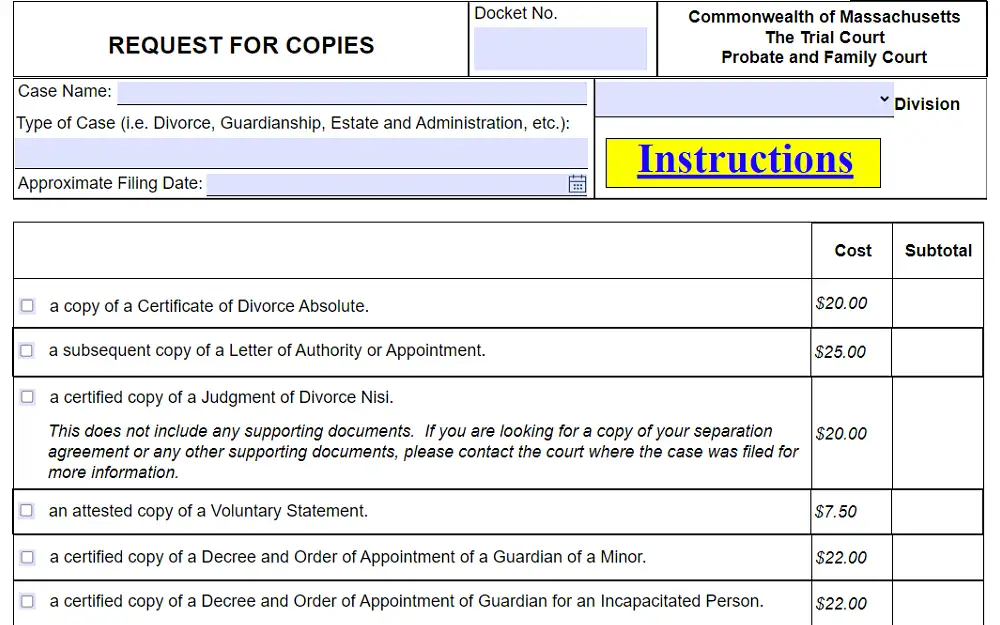
Here is the contact information for both courthouses in the county:
South Woburn Probate & Family Court
10-U Commerce Way,
Woburn, Massachusetts 01801
Phone (Main): 781.865.4000
Phone (Divorce): 781.865.4004
Email: [email protected]
Fax: (617)-225-0781
Hours: Monday through Friday – 8 a.m. – 4.30 p.m.
North – Lowell Probate & Family Court
370 Jackson St, 5th FL.,
Lowell, MA 01852
Phone: 978-656-7700
Email: [email protected]
Fax: (978)-619-1014
Hours: Monday through Friday – 8 a.m. – 4.30 p.m.
Worcester County (including the city of Worcester): The county has a population of about 860,000 residents and is served by the Worcester Probate & Family Court.
Navigate the Virtual Registry for Worcester County to get the docket number for your case, complete the Request for Copies Form, make the payment, include a valid ID, and bring the documents or mail them to the courthouse.
Worcester Probate & Family Court
225 Main Street,
Worcester, MA 01608
Phone: (508)-831-2200
Email: [email protected]
Fax: (508)-752-6138
Hours: Monday through Friday – 8 a.m. – 4.30 p.m.
Suffolk County (including the city of Boston): Suffolk County has a population of 760,000 residents and is served by the Suffolk Probate & Family Court. The court also handles public records for the city of Boston.
Requesters should explore the virtual registry for Suffolk County to get their case’s docket number, complete the Request for Copies Form, include a valid ID, make the payment, and mail or bring the documents to the courthouse.
Suffolk Probate & Family Court
24 New Chardon St.,
Boston, Massachusetts 02114
Phone: 617.788.8301
Fax: (617)-788-8962
Hours: Monday through Friday – 8 a.m. – 4.30 p.m.
Essex County (including the cities of Salem and Lawrence): Essex County has a population of about 800,000 residents and is served by the Essex Probate & Family Court in Salem.7
Record seekers should check the virtual registry for Essex County to get their case’s docket number. Then, complete the Request for Copies Form, include a valid ID, pay the fee, and mail or bring the paperwork to the courthouse.
Essex Probate & Family Court
36 Federal St.
Salem, MA, 01970
Phone: 978.744.1020
Email: [email protected]
Hours: Monday through Friday – 8 a.m. – 4.30 p.m.
Viewing Historical Divorce Records via the Massachusetts Commonwealth Archives (Free)
Massachusetts has a rich history and was one of the first areas to be settled by English colonists. The Plymouth Colony was established by the pilgrims of the Mayflower in 1620, while Boston was founded in 1630.
Because of its long history, the Commonwealth has many public records and a large divorce index, going back to the early 17th century. Various public and private archives, libraries, and courthouses store and manage this huge amount of data. The data is usually well-organized, and easily accessible to the public.
The Massachusetts Court System provides an online reference for obtaining historical divorce records.8 Depending on the date the divorce was granted, interested parties should do the following:
For divorces granted between 1629 and 1692, the records are public; they are listed in the Suffolk Files, which are available at the Judicial Archives, at the Massachusetts Archives Collection, and the local county courts.
For divorces granted between 1692 to 1782, records are available at the locations mentioned above, but also at the Council records.
For divorces granted from 1782 to 1922, records are available at the Supreme Judicial Court, which are available in each county or through this online tool.9
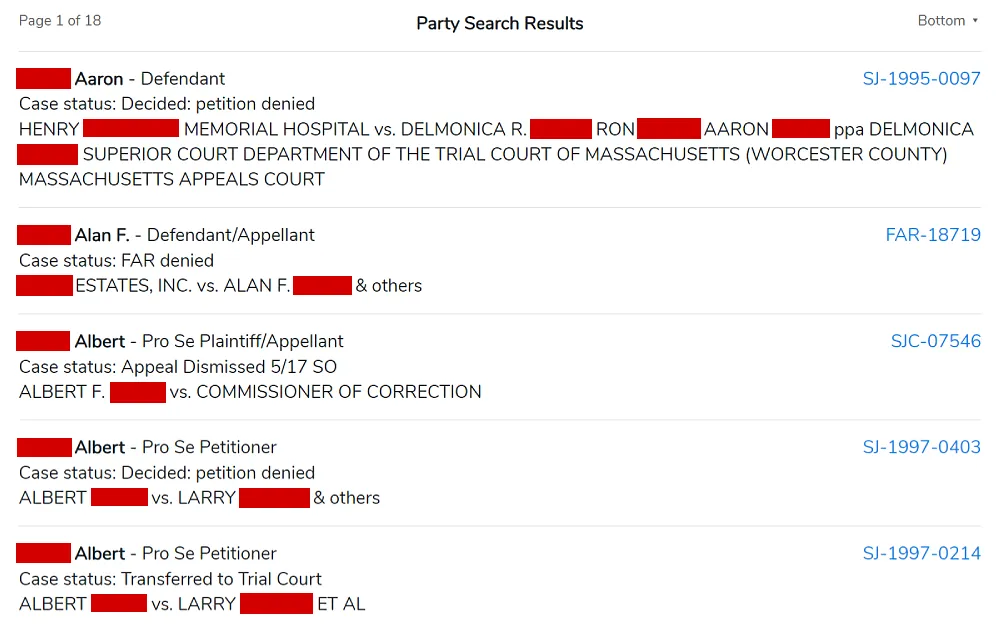
For divorces granted after 1922, the records are handled by the local Probate and Family Courts, depending on each county; utilize the list of courts to find yours.
Look Up Massachusetts Dissolution of Marriage Records
The Commonwealth of Massachusetts does not recognize common-law marriage and common law divorce.10 Unlike other states in the United States, people who live together as married couples, cannot acquire legally married status.
In Massachusetts, a divorce has the same meaning as a dissolution of marriage. Consequently, the steps to find a dissolution of a marriage record are the same as when you are looking for Massachusetts dissolution records.11 All requesters are directed to the local probate and family courthouses, depending on the county that issued the divorce certificate.
File for a Divorce & Respond to Divorce Petitions (Massachusetts Dissolution Process)
Filing for a divorce in Massachusetts is a fairly seamless process.12 To file for a marriage dissolution in Massachusetts, the couple has to live in the Commonwealth for at least 1 year before filing the divorce.
Also, you can divorce in Massachusetts if the reason you want to separate happened in the Commonwealth and you were living there as a couple.
As in most other states, the person filing for divorce must state its legal reasons, also known as the “ground for divorce”. These may include reasons based on fault (a thing that your spouse did, like adultery or physical abuse) or on a no-fault ground (a good example is the breakdown of marriage – when you and your spouse just don’t get along anymore).
Even though Massachusetts doesn’t have a simple “no-fault divorce” provision, there are two types of essentially no-fault divorce proceedings:
1A Divorce: Also known as an uncontested divorce, you will have to provide a separation agreement, which outlines the division of property, debt, alimony, child custody, and other important details. This type of divorce has a streamlined procedure, and you won’t need a divorce attorney. Also, you won’t need to go through mediation.
To file for a 1A divorce, you have to write the separation agreement, where you provide information about property separation, child custody, alimony, and other details. You’ll also need to provide a copy of the certificate of marriage, a Joint Petition for Divorce Form, an affidavit of irretrievable breakdown, a financial statement, and a record of absolute divorce or annulment.13
If you have children under the age of 18, you will need an Affidavit Disclosing Care & Custody Proceeding and a child support worksheet.14
After this, you will have to file the papers and pay the fee (the filing fee is $200, with an additional surcharge of $15). You can file the documents, together with the proof of payment, on the online eFileMA platform. A detailed handbook on how to use the platform can come in handy.
After the divorce is filed, you and your spouse will receive a notice by mail. You will also be notified about the next court hearing, where the judge will decide and grant the divorce. The divorce becomes final 120 days after the court date.
1B Divorce: Similar to traditional divorce, the 1B divorce has no separation agreement, and the entire process is much more difficult and lengthy. You will likely need an attorney to get a divorce appraisal and help you throughout the process.
To file for a 1B divorce, you have to provide a copy of the certificate of marriage, a complaint for 1B divorce, a record of absolute divorce, and a financial statement.15
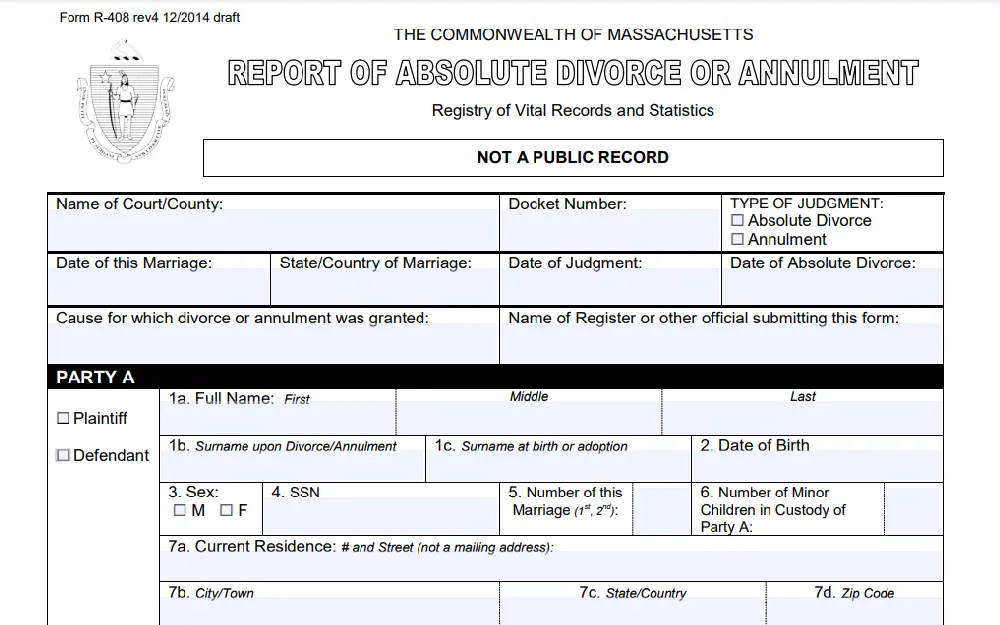
If you have children under the age of 18, you will need a special affidavit and a child support worksheet.
After this, you will need to pay the fees ($200 for the filing fee, $15 for the filing surcharge, and $5 for the summons charge). You can file the documents, together with the proof of payment, on the online eFileMA platform.
A detailed reference book on how to use the platform may be helpful to review. Then, you will receive a summons from the court, and you will have to serve the papers to your spouse. Here is a complete guide on the serving process in Massachusetts.
The process is complex, and you will likely need professional legal assistance from a licensed divorce attorney.
After serving the divorce papers, you will have to exchange financial statements with your spouse (and future ex-wife) and settle on a separation agreement. Talk to your divorce attorney to decide on what to write in the separation agreement.
After filing the separation agreement, the trial will begin with a pretrial hearing and multiple trial hearings. The entire process can take months or even years.
Refer back to this streamlined resource any time you need to view or obtain Massachusetts divorce records.
For additional information, you can either look up all Massachusetts marriages or search various free public MA records to retrieve details of property ownership, criminal history, warrants, court cases, and far more.
References
1Commonwealth of Massachusetts. (n.d.). Massachusetts Court System. Retrieved April 12, 2024, from <https://www.mass.gov/orgs/massachusetts-court-system>
2Centers for Disease and Control Prevention. (2023, February 10). Divorce Rates by State: 2019-2021. Retrieved April 12, 2024, from <https://www.cdc.gov/nchs/pressroom/sosmap/divorce_states/divorce_rates.htm>
3Bowling Green State University. (2024, April 04). Divorce Rate in the U.S.: Geographic Variation, 2022. Retrieved April 12, 2024, from <https://www.bgsu.edu/ncfmr/resources/data/family-profiles/loo-divorce-rate-US-geographic-variation-2022-fp-23-24.html>
4Commonwealth of Massachusetts. (2024). Massachusetts Court System – Trial Court Case Access. Retrieved April 12, 2024, from <https://www.masscourts.org/eservices/home.page.2>
5Commonwealth of Massachusetts. (n.d.). Get a copy of a Probate & Family Court record. Retrieved April 12, 2024, from <https://www.mass.gov/how-to/get-a-copy-of-a-probate-family-court-record>
6Commonwealth of Massachusetts, The Trial Court Probate and Family Court. (2015, November 02). Request for Copies. Retrieved April 12, 2024, from <https://courtforms.jud.state.ma.us/publicforms/PFC0003>
7Commonwealth of Massachusetts. (n.d.). Essex Probate and Family Court. Retrieved April 12, 2024, from <https://www.mass.gov/locations/essex-probate-and-family-court>
8Commonwealth of Massachusetts. (n.d.). Get access to historic divorce records. Retrieved April 12, 2024, from <https://www.mass.gov/how-to/get-access-to-historic-divorce-records>
9Commonwealth of Massachusetts, Appellate Courts. (2024). Public Case Search. Retrieved April 12, 2024, from <https://www.ma-appellatecourts.org/>
10Commonwealth of Massachusetts. (n.d.). Why is Massachusetts a Commonwealth? Retrieved April 12, 2024, from <https://www.mass.gov/info-details/why-is-massachusetts-a-commonwealth>
11Commonwealth of Massachusetts. (n.d.). Get a copy of your divorce record. Retrieved April 12, 2024, from <https://www.mass.gov/how-to/get-a-copy-of-your-divorce-record>
12Commonwealth of Massachusetts. (n.d.). Divorce. Retrieved April 12, 2024, from <https://www.mass.gov/divorce>
13Commonwealth of Massachusetts, The Trial Court Probate and Family Court. (2007, September). Joint Petition for Divorce Under M G L Ch 208 Sec 1A (CJ-D 101A). Retrieved April 12, 2024, from <https://courtforms.jud.state.ma.us/publicforms/PFC0017>
14Commonwealth of Massachusetts, Trial Court. (1995, July). Affidavit Disclosing Care or Custody Proceeding. Retrieved April 12, 2024, from <https://www.mass.gov/doc/affidavit-disclosing-care-or-custody-proceeding-ocaj-1-trc-iv/download>
15Commonwealth of Massachusetts, Registry of Vital Records and Statistics. (2017, September 01). Form R-209C. Retrieved April 12, 2024, from <https://www.mass.gov/files/documents/2017/09/01/r408.pdf>
